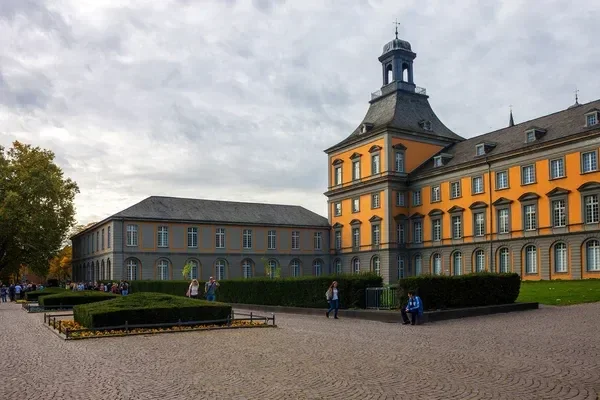From Taiwan to Germany: Michael’s Journey into Biochemical Research
University of Bonn
The baroque, palace-like buildings of the University of Bonn glow orange against the cloudy sky, students chatting across the cobblestone square. Situated on the banks of the Rhine, Bonn is renowned for medicine and biosciences, attracting international students eager to study in Germany. With TaiGer’s support in applications and interview preparation, Michael’s dream of pursuing a master’s in biochemistry became reality.
Early Passion: A Path Toward Biochemical Research
Michael’s interest in biochemistry began as early as junior high school. At a career-planning seminar, he learned about the prospects of the biotech industry, and coupled with his fascination for biology and chemistry, he decided early on to pursue this field.
During high school, he actively joined academic activities in biotech, including Taipei Medical University’s biotechnology and medical camp, as well as exhibitions at Academia Sinica’s Institute of Biochemistry. These experiences nurtured the seed of interest planted years before, strengthening his conviction that biochemistry was his true passion.
Twists and Turns: From Hong Kong Back to Taiwan
Originally, Michael aimed to enter the Department of Biochemical Science and Technology at National Taiwan University (NTU). However, by chance, he first enrolled at Hong Kong Polytechnic University to study Applied Biology and Chemical Technology. Social unrest in Hong Kong eventually prompted him to transfer back to NTU’s biochemistry bachelor’s program, where he successfully graduated.
Although short, his semester in Hong Kong exposed him to Western-style higher education — an experience that unexpectedly laid the groundwork for his later studies in Germany.
Looking Abroad: Choosing the University of Bonn
After graduation, Michael considered continuing at NTU for a master’s program. But with his girlfriend also wishing to study abroad, and with strong family support, he boldly chose to apply overseas.
Given the high costs of studying in the U.S. or U.K., he set his sights on Germany — affordable, yet academically world-class. During his military service, he reached out to TaiGer to handle applications during his limited breaks. With TaiGer’s guidance, he successfully gained admission to the University of Bonn’s master’s program in Biochemistry, a globally respected institution with a particularly strong medical and bioscience faculty.
Recalling the process, Michael notes that applications that year surged dramatically, making competition fierce. The acceptance letter from Bonn’s Master’s program in Biochemistry arrived on his birthday — ‘like receiving a birthday gift,’ he recalls. Looking back, he is especially glad he chose to work with TaiGer, whose guidance helped him navigate the competitive process with confidence.
TaiGer’s Role: From Application to Interview Success
Beyond assistance with his CV and application documents, Michael emphasizes how crucial TaiGer’s selection interview training was. Before his real interview with Bonn, TaiGer provided him with mock questions and conducted a full practice session online. When the actual interview came, the questions were almost identical, allowing him to answer with confidence and composure.
Germany vs. Taiwan: A Contrast in Academic Culture
Having studied in both Taiwan and Germany, Michael observed striking differences:
Exams: In Taiwan, assessments are smaller in scope and spread throughout the semester, with partial credit for general answers. In Germany, exams are usually one comprehensive final, with exacting standards — even missing a single technical term can cost marks.
Scoring: German exams often give low weight to each question, so small mistakes can have big consequences, demanding precision and mastery of detail.
Classroom Culture: Taiwanese students are less likely to ask questions or engage in discussion. In Germany, students actively participate, debate, and even gather after class to continue discussions, creating a more vibrant learning environment.
Group Work: In Taiwan, group projects often mean dividing tasks with minimal interaction. In Germany, group projects involve intensive collaboration and critical debate, reflecting stronger academic enthusiasm.
“In Germany, you can really feel everyone’s passion for academics,” he says.
Collaboration
This vibrant, discussion-driven culture is reflected not only in classrooms but also in collaborative settings, where students actively exchange ideas and build on each other’s perspectives. Michael found that German group work emphasized true teamwork — questioning, debating, and collectively shaping solutions.
Who Thrives in Germany?
Based on his experience, Michael believes successful students in Germany need three traits:
Ability to thrive under pressure
Positive attitude when facing challenges
An open, flexible mindset
He notes that even top students may struggle initially. The German system is demanding, with exams, reports, and presentations crammed into short semesters. Students must handle pressure and disappointment constructively.
Yet he also realized that grades aren’t everything. In Germany, practical skills and research experience often outweigh theory.
For example, during his bachelor’s studies, he specialized in immunology and became proficient in lab techniques like ELISA, MTT assays, and flow cytometry. These skills not only strengthened his application to Germany but will also serve as key advantages in his academic and professional career.
Stepping Out of the Comfort Zone
Michael’s story reminds us that leaving one’s comfort zone is never easy, but only by taking that leap can you see a bigger world.
Whether adjusting to Germany’s academic system or balancing theory with practice, he faced challenges with determination and resilience. In doing so, he established his place on the international academic stage.
If you are also seeking your own study-abroad path, perhaps Germany is where your next chapter begins — and with TaiGer’s expert guidance in applications, interviews, and settling in, you won’t be navigating that journey alone.


